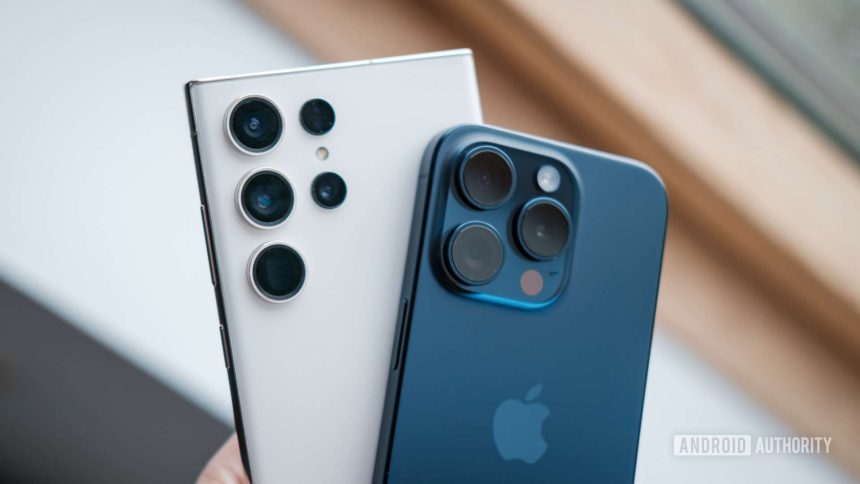For any startup founder or tech enthusiast gearing up to upgrade their smartphone, there’s one question that sparks endless debates: Should you go for an iPhone or a Samsung device? Beyond just shiny gadgets, your phone choice can shape how you work, connect, and innovate.
Here’s what you need to know if you’re a digital hustler deciding between these tech titans.
Since Apple launched the iPhone in 2007, the smartphone market has been split down the middle. The iPhone reshaped the industry with its minimalist design, sleek user interface, and a tightly controlled ecosystem.
Samsung, meanwhile, has emerged as Apple’s fiercest rival, dominating the Android landscape with devices across all price points and pioneering innovations like foldable screens.
According to Counterpoint Research, Apple and Samsung together account for over 40% of global smartphone sales, underscoring how entrenched this rivalry has become.
Design and Build: Minimalism vs. Variety
Apple’s iPhones are renowned for their uniform, premium design language: sleek glass and aluminum frames, and a reputation for durability. Even with minor changes across generations, an iPhone is instantly recognizable.
Samsung, however, offers variety—from the elegant Galaxy S series to the futuristic Galaxy Z Fold lineup. For tech enthusiasts wanting to stand out, Samsung’s designs, colors, and form factors often feel more adventurous.
Operating Systems: Ecosystem Matters
Apple’s iOS is lauded for its stability, security, and seamless integration with other Apple products. It’s a locked-down environment but one that “just works,” especially if you’re using a MacBook, iPad, or Apple Watch.
Samsung devices run on Android, layered with Samsung’s One UI. This system offers unmatched customization and flexibility. You can tweak your interface, install third-party apps freely, and integrate with a broader ecosystem of devices beyond just Samsung’s own lineup.
For startup founders juggling multiple apps and systems, Android’s openness can be a blessing—but also demands more tech-savvy management.
Camera and Performance
For years, the iPhone has been the benchmark for mobile photography and video quality. From influencers to filmmakers, many professionals rely on the iPhone’s consistency, color accuracy, and reliable software updates.
Samsung, though, is no slouch. Its flagship models often pack higher megapixel counts, innovative zoom capabilities, and advanced low-light performance. The Galaxy S24 Ultra, for example, offers a powerful 200MP sensor and 10x optical zoom, appealing to creative professionals who want versatility.
Performance-wise, Apple’s A-series chips consistently lead benchmarks for speed and efficiency. Samsung’s Exynos or Qualcomm Snapdragon chips offer strong performance as well, but occasionally lag slightly behind Apple in raw power.
Battery, Charging, and Longevity
Apple has made strides with battery life, especially in the iPhone 15 lineup, but fast charging still trails behind Samsung’s leading models, which can top up significantly faster.
When it comes to long-term support, Apple wins the software game, offering iOS updates for five or more years. Samsung has improved dramatically, now promising up to seven years of software support on its flagship devices.
Price and Value for Money
Apple devices generally carry a higher price tag, positioning them firmly in the premium segment. Yet, they also tend to hold resale value better than most Android counterparts—a significant factor for cost-conscious entrepreneurs.
Samsung, however, offers a broader range—from entry-level to ultra-premium—providing flexibility for every budget. That’s crucial for startup founders who may want flagship performance without blowing through runway capital.
The Verdict for Tech Enthusiasts
So, iPhone or Samsung? It depends on your priorities:
- Choose iPhone if: You value tight ecosystem integration, stable performance, and long-term updates. Great for founders embedded in Apple’s universe.
- Choose Samsung if: You crave flexibility, experimental tech like foldables, and customizable experiences. Perfect for innovators who want to push boundaries.
For startup leaders, your smartphone isn’t just a gadget—it’s a mobile office, a content creation tool, and a hub for your entrepreneurial hustle. Whichever you choose, make sure it’s the one that fits how you work and live, rather than simply following the crowd.
As the smartphone wars rage on, one thing’s clear: the iPhone vs. Samsung debate isn’t just about devices—it’s about how we shape the future of tech itself.
Talking Points
For African Entrepreneurs, the Ecosystem Debate Hits Harder. In Africa’s digital economy, cost and flexibility matter. Samsung’s broad price range makes it far more accessible to startup founders and young professionals.
Yet, many African digital creatives crave iPhones because of better camera quality and resale value. Is brand prestige getting in the way of smart financial choices?
The Hidden Tax of Being an Apple User in Africa. Apple devices often cost 30-50% more in African markets than in the US or Europe due to import duties, taxes, and exchange rates.
iMessage exclusivity, FaceTime lock-ins—these divide communication, leaving Android users excluded. Are we creating digital classes where only elites can afford seamless Apple experiences?
Samsung Is Innovating… But Is It Too Much? Samsung’s foldables and 200MP cameras are technological marvels—but how many users actually need a folding screen?
Are African consumers being sold expensive gadgets while still battling basic issues like network coverage and power supply?





